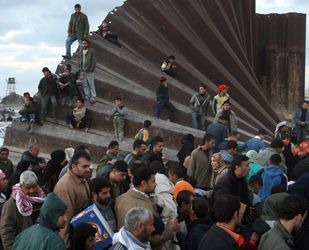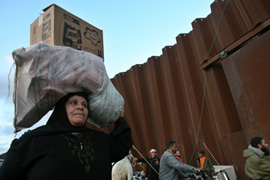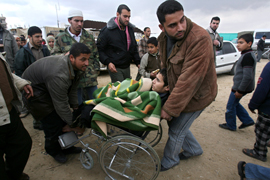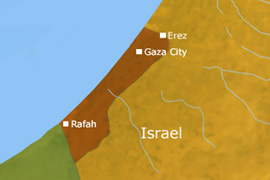Blockaded Gazans pour into Egypt
Palestinians blast through border wall in search of food, fuel and medical care.

| Your Views |
“But there is no justification to demand that we allow residents of the Gaza Strip to live a normal life at a time when from their streets rockets and shells are fired into Sderot and other communities in the south.”
Al Jazeera’s Amr El-Kahky, reporting from the Egyptian side of the Rafah crossing, said that Egyptian security forces did not take any action over the entry of Palestinians.
Hosni Mubarak, the Egyptian president, later said he had ordered his soldiers to allow Palestinians to cross into Egypt because they were starving.
“I told them to let them come in and eat and buy food and then return them later as long as they were not carrying weapons,” he said.
 |
| Many Palestinians took the opportunity to buy much needed supplies from Egypt [AFP] |
That response had drawn angry protests and complaints that Gaza was under siege not just from Israel but also by neighbouring Arab countries.
 |
| Others went across the border in search of medical care [AFP] |
Witnesses said some Palestinians were only seeking to stock up on necessities, but others might stay longer in Rafah to meet relatives stranded in the Egyptian city of Arish.
UN deliberations
At the UN Security Council, Libya, which chairs the council this month, said after closed-door consultations that 14 of the 15 members had agreed on a statement but indicated that the US delegation had “expressed the need to refer to its capital”.
 |
| The Rafah crossing is the only escape from Gaza that bypasses Israel |
Washington, a staunch ally of Israel, is adamant that any council statement must take into account Israel‘s security concerns.
Gilad Cohen, Israel‘s UN delegate, whose country is not a member of the council, insisted that the statement must condemn Gaza‘s ruling Islamist movement Hamas “and the people that are firing at Israel every day”.
However, Riyad Mansour, the permanent Palestinian observer to the UN, said that the situation was “absolutely untenable.”
He said: “The Israeli policy of brinkmanship is creating a humanitarian catastrophe in the Gaza Strip, heightening fears and tensions, inciting, provoking and fueling the vicious and dreaded cycle of violence.”
An Arab delegation meeting at the security council continue to push for a strong condemnation of Israel’s lockdown of the Palestinian territory.
They have written a so-called “presidential statement” regarding the Gaza blockade, and was approved by 14 of the 15 members of the security council.
Bashar Ja’afari, the Syrian ambassador to the UN, defended the statement.
He said: “The language of the presidential statement as written reflects only the humanitarian aspect of the situation in Gaza, the American position is based on politicising it by adding new elements in it.”
Egyptian explanation
When Gaza residents poured across the border into Egypt in search of food and fuel, Maged Abdel Fattah Abdelaziz, the Egyptian ambassador to the UN, explained his country’s decision to let the Palestinians enter through the Rafah crossing.
He said: “I am not going to stop there and shoot on the Palestinian people coming over to the Egyptian territory … to the contrary, I am providing assistance that I intended originally to give to the Palestinian people, to cross to their land and to give them this assistance.”
“Israel cannot tell us what to do – we decide to whom we give humanitarian assistance.”
The council is to meet again at 11am (1600 GMT) on Thursday to try to reach a consensus.

